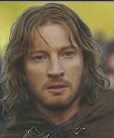Aragorn by atalante_star
Who is Aragorn in the movie?
Introduced as Strider, but unmasked as Aragorn only at the Council of Elrond. A lean, dark, tall Ranger, confident and not so stern and severe in words and appearance. Mind focussed on Arwen as well as his role in the Fellowship.
Who was Aragorn in the books?
Introduced as Strider but quickly uncloaked in Bree as Aragorn. A lean, dark, tall Ranger, stern and severe in words and appearance, but doubting in his ability. Mind focussed on his job.
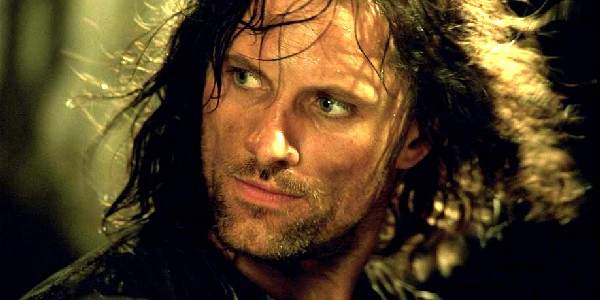
Character comparison for FotR
Who is Strider? – differing attitudes toward the Rangers
The folk of Bree and the Shire were unaware of the true role of the Rangers in the book, and they looked upon the cloaked strangers with contempt.
“Travellers scowl at us, and countrymen give us scornful names. “Strider” I am to one fat man who lives within a day’s march of foes that would freeze his heart, or lay his little town in ruin, if he were not guarded ceaselessly.” (FotR, The Council of Elrond)
This dismissive attitude was also applied to Strider by the men of Bree, shown in this quote from Butterbur:
“But if I was in your plight, I wouldn’t take up with a Ranger.” (FotR, Strider)
The Rangers in the books are a secretive folk, seeming to wander through Middle-earth in a purposeless manner.
“He is one of the wandering folk – Rangers we call them. He seldom talks: not but what he can tell a rare tale when he has the mind. He disappears for a month, or a year, and then he pops up again. He was in and out pretty often last spring; but I haven’t seen him about lately. What his right name is I’ve never heard: but he’s known round here as Strider.” (FotR, At the Sign of the Prancing Pony)
In the film, however, the Rangers are introduced as “dangerous” – giving a completely different impression.
Butterbur: “He’s one of them Rangers, dangerous folk they are, wanderin’ the wilds. What his right name is I’ve never ‘eard, but ’round here he’s known as ‘Strider'” (Arrival at Bree, At the Inn)
Strider
In the book, Strider had a shaggy head of dark hair flecked with grey, a pale stern face and a pair of keen grey eyes. He wore a dark-green travel-stained hooded cloak with high boots of supple leather that had seen much wear and were caked with mud.
“As Strider was speaking they watched his strange eager face, dimly lit in the red glow of the wood-fire.” (FotR, A Knife in the Dark)
“In the dark at the rear, grim and silent, walked Aragorn.” (FotR, A Journey in the Dark)
While his demeanour was grim and forbidding, he did break out into occasional laughs, and it became clear to the hobbits that he had their welfare firmly at heart. Indeed, by their arrival at Rivendell, Frodo told Gandalf that he had become very fond of the Ranger.
Viggo Mortensen as Strider matched rather well the book’s description of the Ranger. He has dark hair, grey-ish eyes, shaggy hair and lots of dirty clothes. But he doesn’t have the “aesthete”-type appearance of Aragorn in the books, and he doesn’t look as old as in the books – grey hairs certainly do not make an appearance.
Deprecation, self-doubt and acceptance of failure
Aragorn’s sense of self-doubt, and almost even self-dislike, is obvious from the start of his appearance in the book, and it is only enhanced by the men of Bree’s low opinion of him. He did not immediately take charge of the hobbit party, as he did in the film, instead he waited until the hobbits had voiced their doubts, and Frodo had read Gandalf’s letter. Only then did Strider ask if the hobbits would accept him as a guide.
“”Tomorrow you will have to escape, if you can. Strider can take you by paths that are seldom trodden. Will you have him?” There was a heavy silence. Frodo made no answer, his mind was confused with doubt and fear.” (FotR, Strider)
Then some of his bitterness and doubt came through:
“”But I must admit,” he added with a queer laugh, “that I hoped you would take to me for my own sake. A hunted man sometimes wearies of distrust and longs for friendship.” (FotR, Strider)
as well as the hardships and fear he had encountered through his life:
“”They will come on you in the wild, in some dark place where there is no help. Do you wish them to find you? They are terrible!” The hobbits looked at him, and saw with surprise that his face was drawn as if with pain, and his hands clenched the arms of his chair. … For a while he sat with unseeing eyes as if walking in distant memory or listening to sounds in the Night far away.” (FotR, Strider)
The film version of Aragorn seems much more confident about his abilities and leadership from the start. He simply attaches himself to the hobbit party in Bree, and easily assumes command. Doubts from the hobbits come only after the event, when they are already on their way to Rivendell:
Merry: “How do we know this Strider is a friend of Gandalf?”
Frodo: “We have no choice but to trust him…” (Leaving Bree)
Overall, our initial impression of Strider is quite different in the film. Book Strider is quite diffident, uncertain, but wanting to help Frodo and Gandalf. The film version is a lot more sinister, described as dangerous, and much more certain of his role in Frodo’s journey.
Vows to serve
After Aragorn became part of the hobbits’ party in the book, he immediately pledged himself to their cause.
“I am Aragorn son of Arathorn, and if by life or death I can save you, I will.” (FotR, Strider)
This same strength of vow is held back in the film until the Council of Elrond:
Aragorn: “If, by my life or death, I can protect you, I will. You have my sword!” (The Council of Elrond, Forming of the Fellowship)
and is repeated even later:
Aragorn: “I would have gone with you to the end. Into the very fires of Mordor.” (Breaking of the Fellowship; Amon Hen)
The Heir of Isildur
While Aragorn is full of doubt about his abilities in the book, he does have a good understanding of his potential future role, and often shows his wisdom and inherent power. In contrast, the film Aragorn seems to have rejected the possibility of his future kingship.
In the book, Aragorn is acknowledged leader of his people, the Northern Dúnedain, and by virtue of being Isildur‘s Heir, he has the right to claim the throne of Gondor. That he hasn’t claimed the throne yet never implied that he didn’t intend to.
Aragorn’s heritage and wisdom is revealed early, if only cryptically, in the book. Strider’s riddle (“All that is gold does not glitter ….”) is quickly revealed in Bree, and Aragorn wears Narsil from the start. He also acknowledges his future role:
“He drew out his sword, and they saw that the blade was indeed broken a foot below the hilt. “Not much use is it, Sam?” said Strider. “But the time is near when it shall be forged anew.”” (FotR, Strider)
His inherent power is also shown early, and how it is shown is actually reflected in the film scene when Galadriel is offered the Ring.
“”If I was after the Ring, I could have it – NOW!” He stood up, and seemed suddenly to grow taller. In his eyes gleamed a light, keen and commanding. Throwing back his cloak, he laid his hand on the hilt of a sword that had hung concealed by his side.” (FotR, Strider)
Strider is also shown to be wise, and knowledgeable about ancient ways. He talks several times of the olden days, once reciting the tale of Lúthien.
“”It is told that Elendil stood there watching for the coming of Gil-galad out of the West, in the days of the Last Alliance.” The hobbits gazed at Strider. It seemed that he was learned in old lore, as well as in the ways of the wild.” (FotR, A Knife in the Dark)
The film, however, suggests that Aragorn has renounced any idea of his Kingship.
Gandalf: “There is one who could unite them, one who could reclaim the Throne of Gondor…”
Elrond: “He turned from that path a long time ago. He has chosen exile…” (Many Meetings, Gandalf and Elrond confer)
So, in the book we have an unconfident Aragorn who is clear about his destiny, while in the film we have a confident Aragorn who has seemingly rejected his destiny. This is summed up well in a review by Harvey O’Brien
(http://indigo.ie/~obrienh/lotr1.htm):
“Viggo Mortensen is suitably uncouth looking as Aragorn, but there is no time for the ambiguities necessary to set him up properly.”
Aragorn and Arwen
Arwen‘s role in Aragorn’s life is only hinted at in the book, such as in these three quotes:
“I dwelt there [Rivendell] once, and still I return when I may. There my heart is” (FotR, Flight to the Ford)
“He turned to Strider. “Where have you been, my friend? Why weren’t you at the feast? The Lady Arwen was there.” Strider looked down at Bilbo gravely. “I know,” he said. “But often I must put mirth aside.”” (FotR, Many Meetings)
“Near him [Elrond] sat the Lady Arwen. To his surprise Frodo saw that Aragorn stood beside her; his dark cloak was thrown back, and he seemed to be clad in elven-mail, and a star shone on his breast.” (FotR, Many Meetings)
All these quotes could be seen as ambiguous – and interpreted as either love for Arwen, love for Rivendell, or simply friendship with Arwen.
From nearly the first moment Arwen is seen in the film, the closeness of her relationship with Aragorn is obvious – though startling a Ranger and holding a sword to his neck is not necessarily a good relationship move!
Soon, the situation is made even clearer, with a moonlit scene on the bridge below Rivendell.
Arwen: “Renech i lu i erui govannem?” (Do you remember when we first met?)
Aragorn: “Nauthannem i ned ol reniannen.” (I thought I had strayed into a dream.)
Arwen: “Gwennin in enninath…” (Long years have passed…) “Ú-‘arnech in naeth i si
celich.” (You did not have the cares you carry now.) “Renich i beth i pennen?” (Do you remember what I told you?)
Aragorn: You said you’d bind yourself to me, forsaking the immortal life of your people.
Arwen: And to that I hold. I would rather share one lifetime with you than face all the ages of this world alone. I chose a mortal life.
None of this happens in the books. The love story of Aragorn and Arwen is relegated mainly to the appendices, and even that story is not as direct and blunt as the scene above. To compound the differences from the book, Arwen gives Aragorn the “Evenstar” as a token of her love. In the book, there is no such jewel – but there is the Elfstone, which Galadriel gives Aragorn in Lothlórien as a token of hope. Hope – that Sauron would fall, that Aragorn would become High King, and that he could then marry Arwen.
The Council of Elrond
In both the film and the book, Aragorn’s true heritage is fully revealed at Rivendell. Only in the book is a connection made between Strider, the Rangers, the Númenorean line of kings of old (including Elendil and Isildur), and the kingship of Gondor:
“”Do you mean that Strider is one of the people of the old Kings?” said Frodo in wonder. “I thought they had all vanished long ago. I thought he was only a Ranger.”” (FotR, Many Meetings)
In the film, the most detail given is:
Arwen: “Why do you fear the past? You are Isildur’s heir, not Isildur himself. You are not bound to his fate… “ (Many meetings, Heir of Isildur)
However, in both book and film, Aragorn is introduced to the company as Aragorn son of Arathorn – in the book by Elrond, in the film by Legolas. After being introduced, Aragorn immediately tells Legolas to sit down in the film, showing again his disinterest in his hereditary titles and duties. This idea, totally contrary to the books, is reinforced in FotR EE when Elrond tells Aragorn that he has the power to change the fate of Men, while Aragorn is at Gilraen’s grave. Aragorn replies that he did not want, and never had wanted, that power.
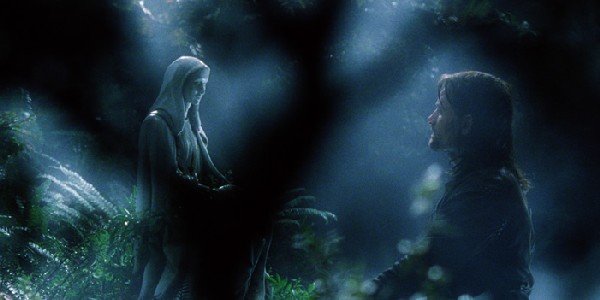
One other small difference between the book and the film is Aragorn’s clothing at the Council. In keeping with his preferred role of Strider, Aragorn is present at the Council wearing his old travel-worn Ranger clothes in the book, while in the film, he wears a rich Elven costume.
From Ranger to Heir
The Council of Elrond chapter in FotR is one of the most important for the character development of Aragorn. It is then that Aragorn renounces his beloved way of life as a Dúnedain Ranger, and takes up the public role of the Heir of Isildur and the Bearer of the Sword that was Broken. It is also in this chapter that the issues Boromir has with Aragorn become apparent – the doubt about Aragorn’s ability and right to lead Gondor clear in his eyes.
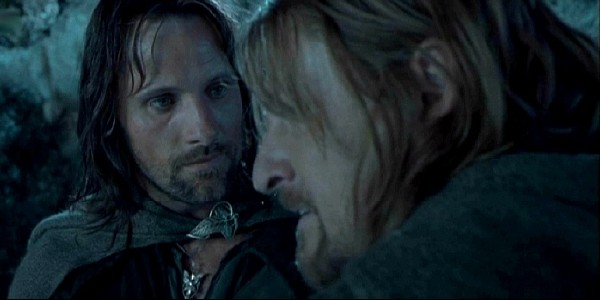
After Boromir’s tirade, Aragorn came out with a particularly royal-sounding comment, saying he will forgive the Gondorian’s doubts:
“For my part I forgive your doubt,” he said. “Little do I resemble the figures of Elendil and Isildur … I am but the heir of Isildur, not Isildur himself.” (FotR, The Council of Elrond)
He continued, explaining (not justifying) to Boromir his choice of lifestyle up till then.
“”If Gondor, Boromir, has been a stalwart tower, we have played another part. Many evil things there are that your strong walls and bright swords do not stay. You know little of the lands beyond your bounds. Peace and freedom, do you say? The North would have known them little but for us. Fear would have destroyed them. But when dark things come from the houseless hills, or creep from sunless woods, they fly from us. What roads would any dare to tread, what safety would there be in quiet lands, or in the homes of simple men at night, if the Dúnedain were asleep, or were all gone into the grave? And yet less thanks have we than you. … That has been the task of my kindred, while the years have lengthened and the grass has grown.
But now the world is changing once again. A new hour comes. Isildur’s Bane is found. Battle is at hand. The Sword shall be reforged. I will come to Minas Tirith.”” (FotR, The Council of Elrond)
Little of this is explained in the film. The Council of Elrond scene has Boromir muttering that Gondor needed no King, and Aragorn quieting Legolas when the elf proclaimed Aragorn’s rights to the Gondorian throne. Nothing is mentioned of the reasons why Aragorn has stayed in the shadows during his life up to that point – indeed, it almost seems like Aragorn is choosing wilfully – first, to stay away from responsibility, then to come back and “usurp” the responsibility of Gondor from the Steward’s shoulders. This, of course, is not in keeping with the book.
Aragorn and Gollum
During the Council of Elrond chapter in FotR, Aragorn recounts his capture of Gollum in the Dead Marshes, and his journey with the creature to the elves of Mirkwood. This is not mentioned in the film.
The making of the Fellowship
In the books, Elrond chooses the companions for Frodo. “For man you shall have Aragorn son of Arathorn, for the Ring of Isildur concerns him closely.” (FotR, The Ring goes South) After that, Aragorn again asks Frodo for leave to be his travelling companion.
In the films, Aragorn is the first to volunteer his services, “If, by my life or death, I can protect you, I will. You have my sword!” (Council of Elrond) This is almost exactly the same wording as Aragorn’s earlier vow to Frodo in the book.
Aragorn and Andúril
While film-goers are still waiting to see Andúril, Aragorn had Narsil reforged to form Andúril in “The Ring Goes South”. He renamed the sword “Flame of the West”, and carried it with him thenceforth.
Aragorn – guide and leader
The Fellowship seem to give more respect to Aragorn as a guide and leader in the book, with even Gandalf deferring to his wisdom.
“”If you bring a Ranger with you, it is well to pay attention to him, especially if the Ranger is Aragorn.”” (FotR, The Ring Goes South)
“”What do you say now, Aragorn?”” (FotR, The Ring Goes South)
Furthermore, his depth of experience of Middle-earth is highlighted.
“I too once passed the Dimrill Gate,” said Aragorn quietly; “but though I also came out again, the memory is very evil. I do not wish to enter Moria a second time.” (FotR, The Ring Goes South)
The first time that Aragorn shows these instinctive qualities in the film is in an event that doesn’t occur in the books – a scene also placed to heighten the tension between Aragorn and Boromir. It takes place when Frodo accidentally drops the ring. Boromir picks it up by its chain, and is looking at it in wonder.
Aragorn: “Boromir!”
Boromir: “It is a strange fate that we should suffer so much fear and doubt over so small a thing. Such a little thing…”
Aragorn: “Boromir! Give the Ring to Frodo!”
Boromir: “As you wish, I care not…” (The Ring Goes South, Braving Caradhras)
In the dark of Moria
The heroics of the sword-wielding Aragorn in the film are matched, and I feel surpassed, by the steady surety, calmness and authority of Aragorn in the book.
“With a bound the Balrog leaped full upon the bridge. Its whip whirled and hissed. “He cannot stand alone!” cried Aragorn suddenly and ran back along the bridge. “Elendil! he shouted. “I am with you, Gandalf!”” (FotR, The Bridge of Khazad-dûm)
After the Balrog had taken Gandalf into the depths, Aragorn unthinkingly took charge of the group, and all automatically followed him.
“With a cry Aragorn roused them. “Come! I will lead you now!” he called. “We must obey his last command. Follow me!” … Aragorn smote to the ground the captain that stood in his path, and the rest fled in terror of his wrath.” (FotR, The Bridge of Khazad-dûm)
The film shows much more of an “action hero” Aragorn, first battling Moria orcs and a cave troll (though the cave troll won that round), and then rocking a huge part of the staircase to the bridge of Khazad-dûm in a sort of “staircase surfing” incident.
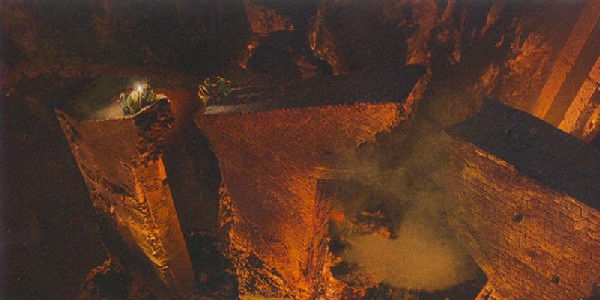
While getting to the staircase, there was an unusual incident in the film. When Gandalf tells Aragorn to lead the Fellowship on, Aragorn hesitates, and Gandalf pushes him to one side. Aragorn stumbles and nearly falls – certainly showing that Gandalf was in charge! But at the last, when Gandalf falls, Aragorn stays still, stunned, looking at the chasm, and is the last to leave the cavern, with arrows from the Orcs whistling all around him – Boromir leading the rest of the party away into safety.
The next signs of leadership from Aragorn in the film are seen in the Dimrill Dale.
Aragorn: “Legolas, get them up.”
Boromir: “Give them a moment, for pity’s sake!”
Aragorn: “By nightfall these hills will be swarming with Orcs. We must reach the woods of Lothlórien… Come Boromir, Legolas, Gimli: Get them up. On your feet, Sam.”
This sign of strength is not appreciated by Boromir.
Lothlórien, the Golden Wood
Within the scenes surrounding Lothlórien, there are a number of small changes in the character of Aragorn.
Coming to the boundary of Lothlórien, it is Legolas who persuades Haldir to let them enter the Golden Wood in the book, while in the film, it is Aragorn who takes that role.
Before the Fellowship reaches Caras Galadhon, the book has one of the most moving descriptions of Aragorn – a scene which is missing from the film, and a scene which provides one of the few truly happy glimpses we have of Aragorn.
“At the hill’s foot Frodo found Aragorn, standing still and silent as a tree; but in his hand was a small golden bloom of elanor, and a light was in his eyes. He was wrapped in some fair memory: and as Frodo looked at him he knew that he beheld things as they once had been in this same place. For the grim years were removed from the face of Aragorn, and he seemed clothed in white, a young lord tall and fair; and he spoke words in the Elvish tongue to one whom Frodo could not see. “Arwen vanimelda, namarië!” he said, and then he drew a breath, and returning out of his thought he looked at Frodo and smiled.
“Here is the heart of Elvendom on earth,” he said, “and here my heart dwells ever”” (FotR, Lothlórien)
Another change is that Aragorn uses Elvish much more frequently in the films than the books. First, he whispers sweet nothings to Arwen in Rivendell, then he talks fluently to Haldir. However, how a mortal Ranger came by such a good grasp of Sindarin is never explained.
Aragorn: “Haldir o Lórien. Henion aníron, boe ammen i dulu lîn. Boe ammen veriad lîn”.
(Haldir of Lórien. We desire your help. We need your protection) (Lothlórien)
Farewell to Lórien
One book scene missing totally from the FotR film, and missing partially from the FotR EE film, is the giving of gifts by Galadriel when the Fellowship are leaving Lothlórien. In the book Aragorn is given a sheath that had been made to fit Andúril, overlaid with a tracery of flowers and leaves, and set with runes formed of many gems showing the name Andúril and the lineage of the sword. When Galadriel asked if there was anything else Aragorn would ask of her, he replied that the only thing he wished for was Arwen, but he knew that Galadriel had not the power to grant that to him. Galadriel instead gifted him the Elfstone.
While the Elfstone is not mentioned in the film, it could be said that the “Evenstar” jewel given to Aragorn by Arwen is a pseudo-substitute. However, it could also be argued that a better comparison would be between Arwen’s “Evenstar” jewel in the film and the jewel that Arwen gives to Frodo in the books (Return of the King, Many Partings). Certainly Frodo’s jewel is similar in design to the “Evenstar” in the film – a white gem like a star upon a silver chain, but the symbolism of hope, longing and constant faith is more consistent between the film’s “Evenstar” and the book’s Elfstone.
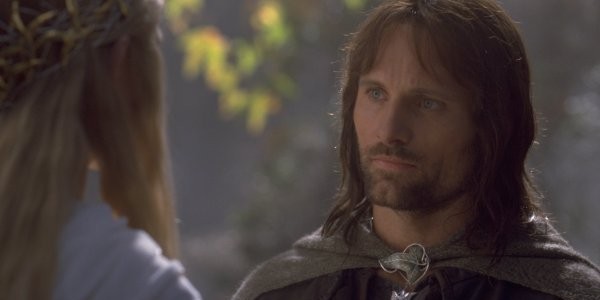
“Aragorn took the stone and pinned the brooch upon his breast, and those who saw him wondered; for they had not marked before how tall and kingly he stood, and it seemed to them that many years of toil had fallen from his shoulders. “For the gifts that you have given me I thank you,” he said, “O Lady of Lórien of whom were sprung Celebrían and Arwen Evenstar. What praise could I say more?”” (FotR, Farewell to Lórien)
The Argonath
Aragorn’s transformation when leaving Lothlórien was accentuated when they reached the Argonath.
“”Fear not!” said a strange voice behind him. Frodo turned and saw Strider, and yet not Strider; for the weatherworn Ranger was no longer there. In the stern sat Aragorn son of Arathorn, proud and erect, guiding the boat with skilful strokes; his hood was cast back, and his dark hair was blowing in the wind, a light was in his eyes: a king returning from exile to his own land. … “Long have I desired to look upon the likenesses of Isildur and Anárion, my sires of old. Under their shadow Elessar, the Elfstone son of Arathorn of the House of Valandil Isildur’s son, heir of Elendil, has nought to dread!”” (FotR, The Great River)
Aragorn the King emerges. A man certain in his heritage and his destiny. This absolutely does not appear in the films in FotR – or even most of TTT.
While passing the Argonath in the film, Aragorn points out his ancestors to Frodo. Boromir looks deeply moved to be returning to Gondor, while the hobbits look awed, but Aragorn – doesn’t really look awed or moved. There isn’t the revelation and metamorphosis that occurs in the book.
The Breaking of the Fellowship
And finally, here the film and the book agrees about Aragorn’s leadership qualities. For almost the first time since Dimrill Dale, film Aragorn shows a sense of total, unquestioned leadership.
Aragorn: “We cross the lake at nightfall. Hide the boats and continue on foot. We approach Mordor from the North.”
Gimli: “Oh yes? Just a simple matter of finding our way through Emyn Muil, an impassible labyrinth of razor-sharp rocks. And after that, it gets even better. Festering, stinking marshlands, far as the eye can see.”
Aragorn: “That is our road. I suggest you take some rest and recover your strength, Master Dwarf.”
The last series of events in the film – the orc attack, the death of Boromir, and the capture of Merry and Pippin – are not actually included in FotR, being found instead in the first chapter of TTT (“The Departure of Boromir”). This chapter begins with Aragorn climbing up Amon Hen to sit on its high Seat – a great chair constructed by the ancient Gondorians, from which they could review their domain – fitting indeed that the heir to the throne of Gondor should survey what would become his realm if all his plans came to fruition.
Though, Aragorn’s self-doubt is certainly still present:
“”The horn of Boromir! … Alas! An ill fate is on me this day, and all that I do goes amiss!”” (TTT: The Departure of Boromir)
“Thus passes the heir of Denethor, Lord of the Tower of Guard! This is a bitter end Now the Company is all in ruin. It is I that have failed. Vain was Gandalf’s trust in me. What shall I do now? Boromir has laid it on me to go to Minas Tirith, and my heart desires it; but where are the Ring and the Bearer? How shall I find them and save the Quest from disaster?” (TTT: The Departure of Boromir)
Here, also, it is clear to see Aragorn’s instinctive assumption of responsibility for the entire Quest, as well as his automatic assumption of guilt for events that he could not really control. This is very different to the film, where he doesn’t seem to have that innate responsibility for all of the Fellowship, instead leaving that to Gandalf, and to some extent Boromir and Frodo.
The last scene of the film shows Frodo and Sam reaching the far side of the Anduin and walking away from the Fellowship, followed by a gang of Orcs carrying Merry and Pippin away. This is all inferred in the book, with Aragorn, Legolas and Gimli only discovering what had happened to the Hobbits from prints near the river bank and two hobbit blades they found in a pile of Orc bodies. Aragorn decides that he must follow the Orcs:
“”I would have guided Frodo to Mordor and gone with him to the end; but if I seek him now in the wilderness, I must abandon the captives to torment and death. My heart speaks clearly at last: the fate of the Bearer is in my hands no longer. The Company has played its part. Yet we that remain cannot forsake our companions while we have strength left. Come! We will go now! Leave all that can be spared behind! We will press on by day and dusk!”” (TTT: The Departure of Boromir)
The ending of Aragorn’s part in the film is clearly adapted from the previous book quote, though with an added catchy punch-line that I’m not sure Tolkien would have approved of!
“”Not if we hold true to each other. We will not abandon Merry and Pippin to torment and death. Not while we have strength left. Leave all that can be spared behind. We travel light. Let’s hunt some Orc!”” (The Breaking of the Fellowship, Two Go East, One Goes South, Five Go West)
Conclusion
Book Aragorn is noble, but sombre and grim. He is driven by both personal and moral goals, in which the personal goals cannot be realised without the moral goals being accomplished with purely virtuous intentions. He doubts his own abilities to fulfil his role and his heritage, particularly in the period between Gandalf’s fall and return – who could compete with a Maia. However, unlike in the film, he does not doubt himself out of a loss of faith about his heritage, his ancestors or his future role in life.
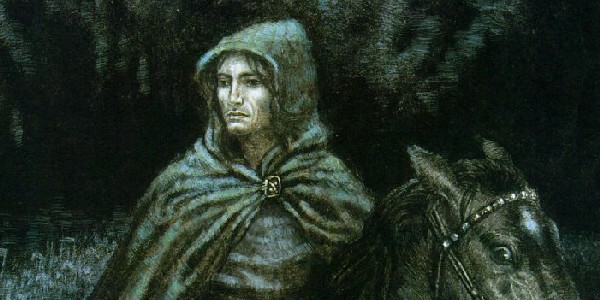
- Many Meetings tells us more about his realtionship with Arwen and his attitude towards his heritage
- Departure From Rivendell shows us more on the relationship between Aragorn and Elrond.
- The Great River has the extra footage of Boromir and Aragorn's conversation.
- Departure of Boromir, or how Aragorn gets to be a hero after all.
Interesting Links:
Our Gallery has a separate section devoted to Aragorn. It also has the screencaps of both the theatrical and the extended version of Fellowship Of the Ring.
A transcript of Lord Of the Rings: Fellowship Of the Ring can be found in our Film Fun & Facts section.
A summary of Lord Of the Rings: Fellowship of the Ring can be found in Elrond's Library.
You can also check out some pictures of Viggo Mortensen in our Gallery, or read a short biography in our Film, Fun & Facts section.
Some articles about this character
- You can read all about Aragorn and Arwen in the Encyclopedia. It also contains information about his mother Gilraen, and his fosterfather Elrond.
- The Middle-earth Section has the text of Strider’s Riddle and The Lay of Lúthien and Beren; as well as some more information on Beren and Lúthien.
- The Stewards and the Royal Family of Gondor: Are They Related? by Cressida tries to answer this very question.
- More information on Aragorn and his heritage can be found in the following articles: The Sword of Elendil by Fossegrim talks about the Shards of Narsil; A History of the Númenóreans, The Númenórean Realms in Exile and The Dúnedain of the North by Nienna-of-the-Valar; and articles on Eärendil and Arwen Undómiel (by Evenstar01). There's also a Family Tree of the Kings of Arnor and Gondor.
Some forums that deal with Aragorn:
- Characterization of Aragorn in the Movie Forum talks about the movie character in depth.
- In the Book Forum there’s A Question About Aragorn discussing his heroic position, and Were Aragorn and Arwen related?.
- The Casting Forum has a thread devoted to Viggo Mortensen and also discusses the first casting of Stuart Townsend as Aragorn.
Take a look at how some artists interpreted this character:
- Aragorn by Anastasia I-Morn-Gwathren
- Strider Reveals His Identity by Anke Eissman
- Arwen and Aragorn by Eissman
- Aragorn by Michael Green
- Aragorn and Legolas by Gwathwen
- Concealment by Hoover
- Aragorn by John Howe
- Aragorn and Arwen by Kaluta
- At the Sign of the Prancing Pony by Kortich
- Aragorn by LastOfIsuldir
- Aragorn by Angus McBride
- Strider by Ryuuri
- Aragorn sketch by Salome
- Aragorn by Soraco
- Aragorn and Arwen by George Ziel
You can have Aragorn as a CoE theme on your computer, or an Aragorn Chat Skin.
Not pleased with the books or the movies?
- Ever wondered what Aragorn might eat for supper? Check out Kitchens of Gondor and Bree in Pippin’s Recipe Box!
- For a more humorous take on Aragorn, take a look at Cassie Claire’s Very Secret Diary of Aragorn son of Arathorn in our Humor Section.
- The Humor Section also has a comic about Aragorn by Zoe.








